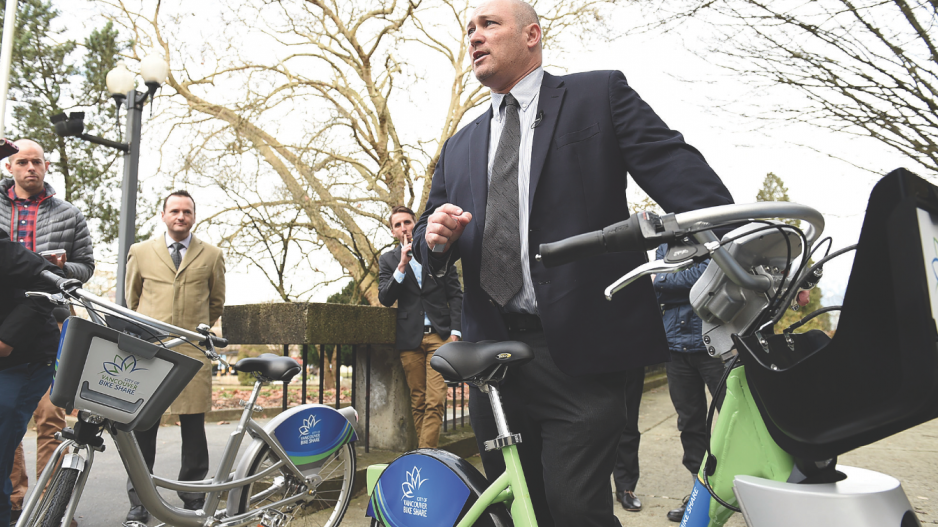As an ambitious June deadline looms, Vancouver’s new bike sharing service is looking for some major support from local businesses in the form of advertising and the use of private property for the yet-to-be-located bike stations.
“It’s a one-of-a-kind opportunity for brands to participate from the exposure,” said Josh Squire, CEO of bike share company Cyclehop, in a February 24 speech that included a pitch to potential sponsors.
“We’ve seen large and small companies support bike share in other cities, and they’re very happy with the way … it enhanced their brand.”
The City of Vancouver has been trying to get a bike share program rolling for five years. The wheels outright fell off the endeavour in November 2013 after the city’s chosen equipment provider, Montreal-based Bixi, went bankrupt. Alta, the company picked to operate Vancouver’s bike share, also faced financial challenges and Vancouver ultimately re-started its procurement process.
Read: Bike share CEO promises not to undercut Vancouver bike rental companies
On February 23 the city announced it had chosen Cyclehop to operate the system, which will consist of 1,500 bikes and 150 stations. The first 1,000 bikes will be in place by June 2016, the city promised, with the rest to follow this summer.
The City of Vancouver will pay Cyclehop $5 million for five years to install, operate and maintain the system, in which customers use a card similar to the Compass card to unlock a bike and return it to any docking station. The 150 stations will be located in the city’s downtown and the area south of False Creek, bounded by Arbutus, 16th Avenue and Main Street. A second phase will extend the boundary west to Macdonald Street and east to Commercial Drive.

Squire started Cyclehop in 2011; the company is based in Miami, Florida and Santa Monica, California. It operates bike shares in several southwestern American cities, and took over Ottawa’s bike share program after Bixi’s bankruptcy. The company is profitable, Squire said.
Read: Can Vancouver avoid Seattle's bike share missteps?
The city has given Cyclehop an ambitious time frame to get things moving: there are currently no specific locations identified for the docking stations, no confirmed sponsors, and the company has yet to determine the price of using the bikes.
Finding station locations could be tricky. The city wants to avoid further cluttering public sidewalks, and although it will consider using parking spots and foregoing up to $800,000 a year in parking meter revenue, the city hopes to work with private property owners who have publicly available areas where docking stations could be located.
That could be a good move for businesses, said Charles Gauthier, president and CEO of the Downtown Vancouver Business Improvement Area (DVBIA). While some downtown businesses opposed the Hornby bike lane when it was installed six years ago, Gauthier said the DVBIA supports the bike share.
“We’ve seen a huge interest in our membership in terms of wanting to cater to cyclists,” Gauthier said. “They want bike racks in front of their businesses, because they do understand that they’re bringing people downtown.”
Gauthier said the DVBIA will be working closely with the city to find the right location for the bike share stations. Granville Street is a good candidate, as is the Vancouver Art Gallery’s north plaza, which will soon undergo renovations.
A local marketing company, Score, is responsible for selling the advertising. They haven’t managed to secure any sponsors yet, said Garnet Nelson, managing director of Score, but received inquiries from interested businesses after the deal was announced on February 23.
Sponsors can either sponsor one station, or can pay to be a title sponsor and have their brand on all the bikes. In other cities with bike share the title sponsor agreement has been worth $2,000-$3,000 per bike, Squire said.

Most bike share systems cost between $4,000 and $6,000 per bike, and the city’s commitment to pay $5 million over five years for the 1,500 bikes works out to $3,300 per bike. Cyclehop is also contributing capital, said Scott Edwards, manager of street activities with the City of Vancouver.
Vancouver coun. George Affleck said he supports bike share, but the system should be able to operate without public funds, like car sharing services like Modo or Car2Go.
The $5 million cost is higher than the supports the city has given to car sharing services like Modo, said Jerry Dobrovolny, general manger of engineering for the city. But Vancouver is committing to supporting bike share because it wants to support an emerging technology that fits with the city’s goal of being a green, healthy city, he said.
The City of Vancouver won’t own any of the equipment, but will receive revenue over a set threshold. Edwards declined to provide information about what that threshold is, but said the city’s main focus is ensuring the system launches successfully.
@jenstden




